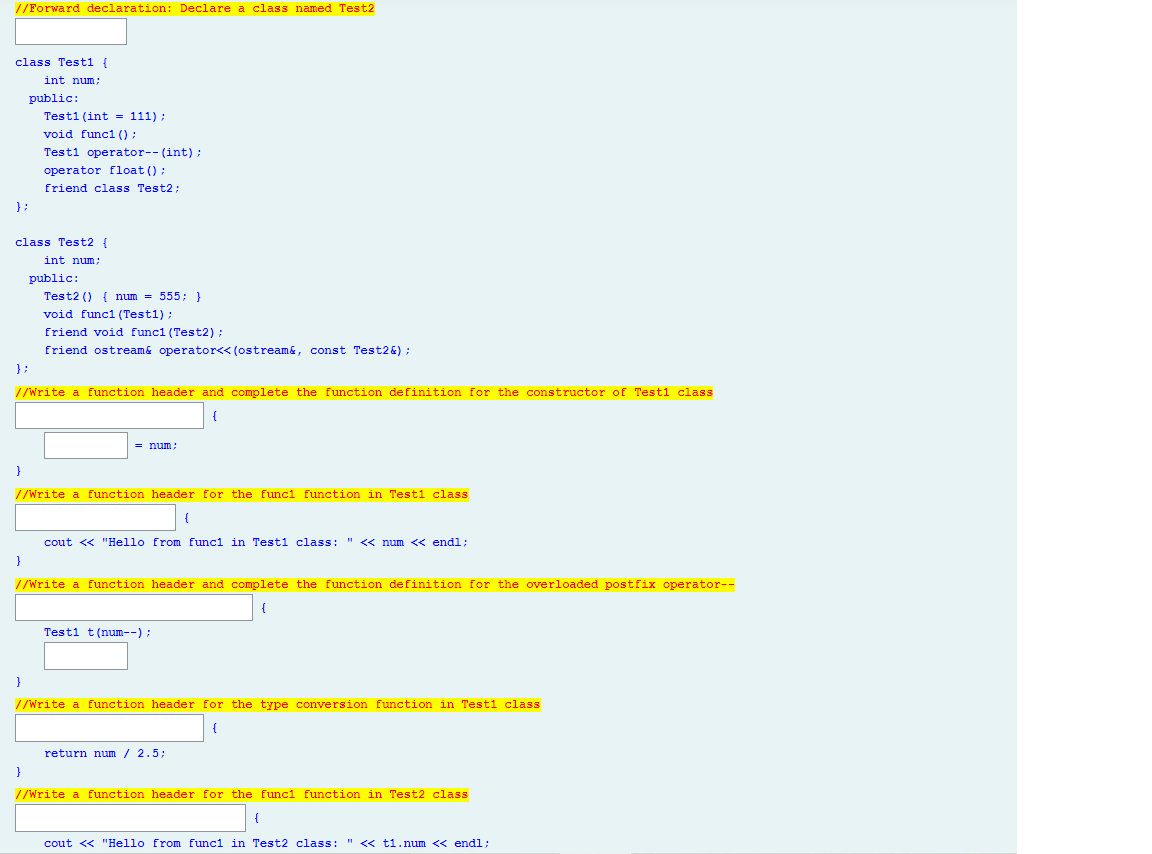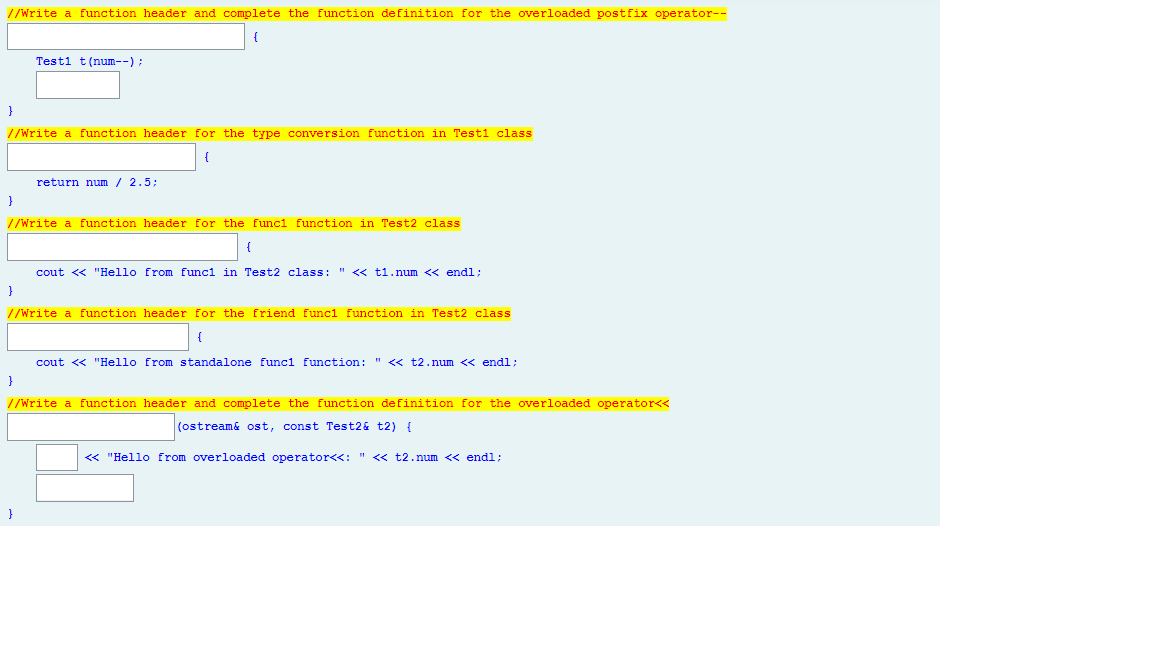//Forward declaration: Declare a class named Test2 class Testi { int num; public: Testi (int = 111) : void funci () : Testi operator-- (int); operator float (): friend class Test2; }; class Test2 { int num; public: Test2 () { num = 555; } void funcl (Test1); friend void func1 (Test2); friend ostream& operator<<(ostream&, const Test2&) ; } ; //Write a function header and complete the function definition for the constructor of Test1 class = num; //Write a function header for the funci function in Testi class cout <« "Hello from funci in Testi class: " « num << endl; //Write a function header and complete the function definition for the overloaded postfix operator-- Testi t(num--); } //Write a function header for the type conversion function in Test1 class return num / 2.5; //Write a function header for the funci function in Test2 class { cout, << "Hell o from func1 in Test2 class:" << t1.num < endl :
//Forward declaration: Declare a class named Test2 class Testi { int num; public: Testi (int = 111) : void funci () : Testi operator-- (int); operator float (): friend class Test2; }; class Test2 { int num; public: Test2 () { num = 555; } void funcl (Test1); friend void func1 (Test2); friend ostream& operator<<(ostream&, const Test2&) ; } ; //Write a function header and complete the function definition for the constructor of Test1 class = num; //Write a function header for the funci function in Testi class cout <« "Hello from funci in Testi class: " « num << endl; //Write a function header and complete the function definition for the overloaded postfix operator-- Testi t(num--); } //Write a function header for the type conversion function in Test1 class return num / 2.5; //Write a function header for the funci function in Test2 class { cout, << "Hell o from func1 in Test2 class:" << t1.num < endl :
Chapter10: Introduction To Inheritance
Section: Chapter Questions
Problem 9RQ
Related questions
Concept explainers
OOPs
In today's technology-driven world, computer programming skills are in high demand. The object-oriented programming (OOP) approach is very much useful while designing and maintaining software programs. Object-oriented programming (OOP) is a basic programming paradigm that almost every developer has used at some stage in their career.
Constructor
The easiest way to think of a constructor in object-oriented programming (OOP) languages is:
Question
100%

Transcribed Image Text://Forward declaration: Declare a class named Test2
class Testi {
int num;
public:
Testi (int = 111);
void funci () ;
Testi operator-- (int) ;
operator float () ;
friend class Test2;
}:
class Test2 {
int num;
public:
Test2 () { num = 555; }
void funcl (Test1);
friend void funci (Test2);
friend ostream& operator<< (ostream&, const Test2&) ;
}:
//Write a function header and complete the function definition for the constructor of Testi class
{
= num;
//Write a function header for the funci function in Testi class
cout <« "Hello from funci in Testi class: " < num « endl;
}
//Write a function header and complete the function definition for the overloaded postfix operator--
Testi t(num--);
}
//Write a function header for the type conversion function in Testi class
return num / 2.5;
}
//Write a function header for the funci function in Test2 class
cout << "Hello from funci in Test2 class: " << ti.num << endl;

Transcribed Image Text://Write a function header and complete the function definition for the overloaded postfix operator--
Testi t(num--);
}
//Write a function header for the type conversion function in Test1 class
return num / 2.5;
}
//Write a function header for the funci function in Test2 class
cout <« "Hello from funci in Test2 class: " << ti.num << endl;
}
//Write a function header for the friend funcl function in Test2 class
cout <« "Hello from standalone funci function: " <« t2.num << endl;
}
//Write a function header and complete the function definition for the overloaded operator<<
(ostream& ost, const Test2& t2) {
« "Hello from overloaded operator<<: " <« t2.num << endl;
Expert Solution
This question has been solved!
Explore an expertly crafted, step-by-step solution for a thorough understanding of key concepts.
Step by step
Solved in 2 steps

Knowledge Booster
Learn more about
Need a deep-dive on the concept behind this application? Look no further. Learn more about this topic, computer-science and related others by exploring similar questions and additional content below.Recommended textbooks for you

Microsoft Visual C#
Computer Science
ISBN:
9781337102100
Author:
Joyce, Farrell.
Publisher:
Cengage Learning,

EBK JAVA PROGRAMMING
Computer Science
ISBN:
9781337671385
Author:
FARRELL
Publisher:
CENGAGE LEARNING - CONSIGNMENT

Programming Logic & Design Comprehensive
Computer Science
ISBN:
9781337669405
Author:
FARRELL
Publisher:
Cengage

Microsoft Visual C#
Computer Science
ISBN:
9781337102100
Author:
Joyce, Farrell.
Publisher:
Cengage Learning,

EBK JAVA PROGRAMMING
Computer Science
ISBN:
9781337671385
Author:
FARRELL
Publisher:
CENGAGE LEARNING - CONSIGNMENT

Programming Logic & Design Comprehensive
Computer Science
ISBN:
9781337669405
Author:
FARRELL
Publisher:
Cengage